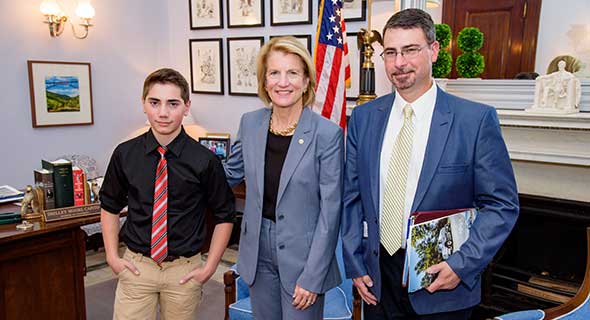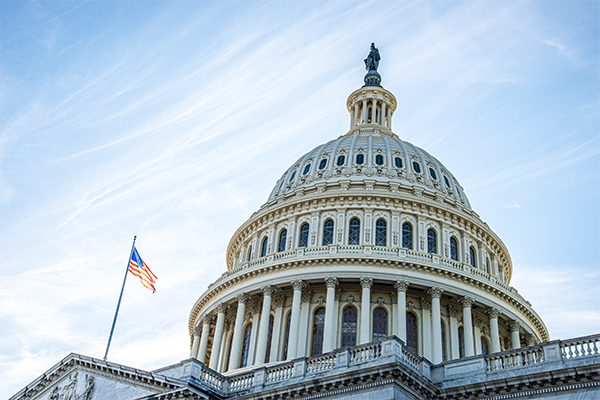Seeking replacement bobtail drivers

Brian Crespo of Blue Flame Inc., right, and his son Jacob pose for a photo at Propane Days with Sen. Shelley Moore Capito, R-W.Va. Photo courtesy of Tom Osina
One full-time Blue Flame Inc. bobtail driver is 71 years old. Another is 65.
Replacing veteran drivers like these as they move into retirement will not be an easy task, says Brian Crespo, operations manager at Blue Flame, which has locations in Berkeley Springs and Fairmont, W.Va.
“Last year, I had 32 applications come in,” Crespo says. “A lot of the guys who came from driving schools had a lot of knowledge. We quizzed them on parts of the truck and they did well, but when you put them in the truck they couldn’t do it. They had enough skills to get their license, though, which tells you right there that more education is not needed.”
Still, Crespo’s hiring task will become even more difficult come September, he says, if the federal government finalizes new entry-level driver training rules.
“We’ve seen government regulations coming on,” Crespo says. “The biggest thing is the hassle to get your CDL (commercial driver’s license) and the hoops you jump through to get your hazmat [license].”
These challenges were one reason Crespo attended the National Propane Gas Association’s (NPGA) Propane Days lobbying event in Washington, D.C. Crespo lobbied on Capitol Hill with his son, Jacob, and Tom Osina, executive director of the West Virginia Propane Gas Association. The three met with Sen. Shelley Moore Capito, R-W.Va., as well as staff representatives of Sen. Joe Manchin, D-W.Va. They also visited the offices of West Virginia’s House members to voice concerns on behalf of the propane industry.
The West Virginia group discussed several issues with Capito and Manchin’s staff, but the entry-level driver training rules were a talking point Crespo emphasized.
“They’re really trying to take what can be a really good middle-class or working-class type of job and turn it into needing a four-year degree,” he says. “The government is pressing for more training of new drivers, and it’s based on nothing more than the government getting together and saying, ‘This looks good; let’s go with it.’”
According to NPGA, a 2012 bill required the Federal Motor Carrier Safety Administration (FMCSA) to establish minimum entry-level driver training standards, including knowledge and skills training, before obtaining a CDL or a hazardous materials endorsement. Under the new rule, potential new drivers would have to complete at least 30 hours behind the wheel and pass a knowledge test before being allowed to take the CDL test.
“We’re not opposed to safety – let’s be safe – but what’s the point in adding another layer of regulation?” Crespo says. “This is having to take a test to take the test.”
Phil Squair, senior vice president of public and governmental affairs at NPGA, agrees this particular law is burdensome to marketers.
“Why 30 [hours] and not 25?” Squair says. “It’s the nanny government coming in.”
The regulation is also one more deterrent for job seekers who might otherwise pursue careers in the trucking industry, which experienced a 38,000-driver shortage in 2014, according to the American Trucking Associations (ATA). The shortage was expected to reach 48,000 drivers by the end of last year, ATA reports, and, if the current trend continues, the shortage could rise to almost 175,000 by 2024.
Marketers particularly struggle to hire veteran truck drivers, Crespo adds, because propane trucking jobs are typically more strenuous than other trucking jobs.
“They think they’re going to come deliver for us because they have driven a delivery truck before,” he says. “But they get out of the truck 30-plus times a day and drag a hose. They’re used to getting in the truck in the morning, driving several hours, taking a break, driving some more and calling it a day.”
Yet another trucking-related issue marketers addressed at Propane Days is the 34-hour restart provision. According to NPGA, a 2016 bill includes a provision preventing FMCSA from implementing a 2013 rule restricting the use of the truck driver 34-hour restart. However, additional clarification is needed from Congress to ensure the provision remains available to drivers. NPGA says limitations on the restart rule hinder the industry’s ability to serve customers efficiently.
Marketers addressed several other legislative issues with Congress at Propane Days, as well. They discussed propane autogas initiatives, asking Congress to support a long-term extension of the Alternative Fuels Credit and Refueling Infrastructure Credit, both of which expire at the end of this year. In addition, marketers asked Congress to expand the Alternative Fuels Credit to include commercial landscaping equipment.
Community gas systems were another talking point in Washington. Marketers asked Congress to reform the Department of Transportation’s (DOT) rules pertaining to them, and Congress delivered in mid-June, putting a bill on President Obama’s desk that calls for the secretary of transportation to enter into an agreement with the Transportation Research Board (TRB).
Obama signed the bill, directing DOT and TRB to conduct a study examining the regulatory requirements, techniques and best practices applicable to pipeline facilities that transport or store only petroleum gas or mixtures of petroleum gas and air to 100 or fewer customers.
“DOT has some fairly confusing rules,” Squair says. “We’re regulated much the same way as natural gas systems are regulated. A propane system serving 10 customers is facing the same regulation as a natural gas system serving thousands. We want to raise the profile of these systems as something good for customers. You can serve a lot of customers from a single tank – it’s safer – and if you can serve customers from one tank, you’re connecting and disconnecting once. It’s 10 times [safer] for these types of systems.”
The number of federal regulations being enforced is getting out of hand, adds Blossman Gas President Stuart Weidie.
“There were 3,410 [federal] regulations with more than 800,000 pages of rules in 2015,” says Weidie, who assumed NPGA chairman duties ahead of Propane Days. “We’ve had enough of that. Some of the industry and the public are tired of the government coming up with rules and regulations, and there is some sense of hope, perhaps, that we’ll see a change.”

















I am glad that I do not have to jump through all the hoops to get a hazmat driver’s license, which I used to have before becoming disabled.